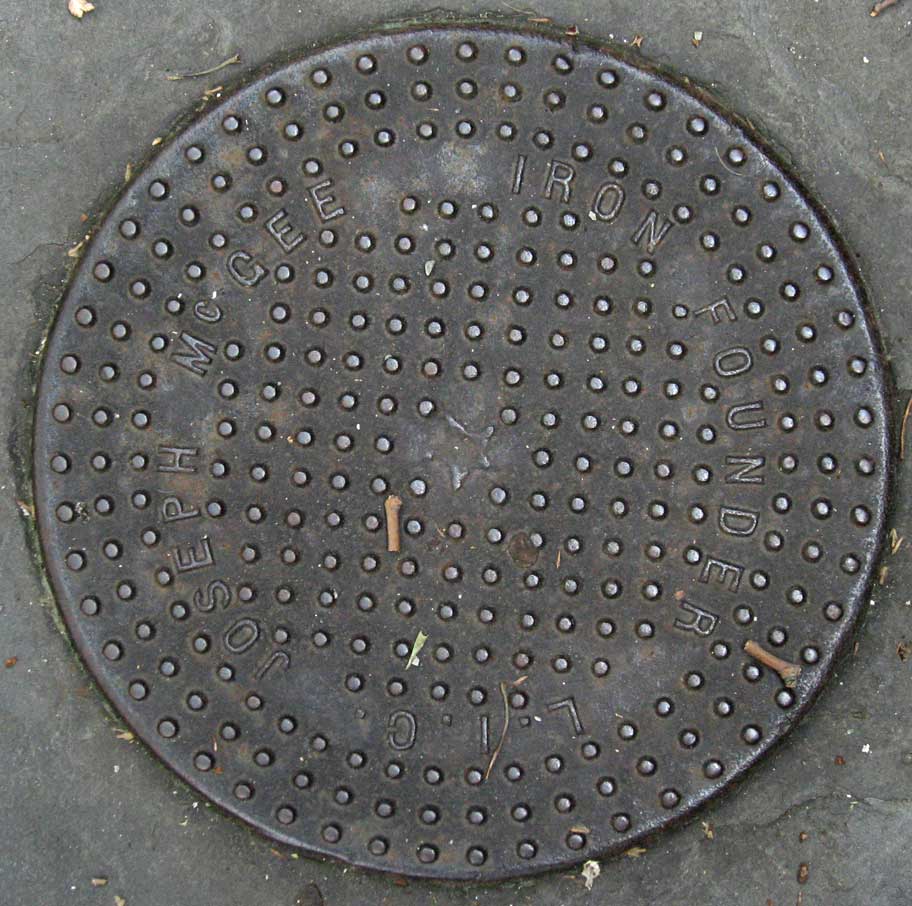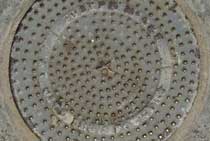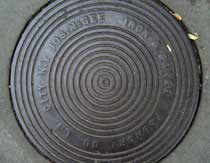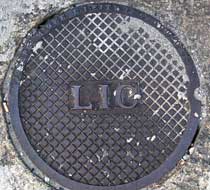

This sidewalk lid, probably a coal chute cover, is inscribed, "Joseph McGee / Iron Founder / L. I. C.."
Joseph McGee manholes, coal chute covers, etc. can be found throughout Long Island City. These are a few examples:

|

|

|
Nextdoor to 21-22 45th Ave. is 21-24 45th Ave., where a similar cover seems to have suffered rough treatment over the years. 5-29 49th Ave. is inscribed, "Jos. McGee / Iron & Brass Foundry Co. / L. I. City N. Y.." The one on Vernon Blvd. has Joseph's McGee's name on the rim with a large "LIC" in the center. This one is big enough to be a genuine manhole cover. It is located on Vernon Blvd. between 44th Drive and 44th Road.
Joseph McGee (1847-1897) was in immigrant from Ireland who achieved some measure of success as an iron founder in Long Island City. His obituary in the New York Times (7 July 1897, p. 7) reads in part, "Joseph McGee, one of the best-known residents of Long Island City, died at his home, 111 Fifth Street, that city, yesterday from a complication of diseases. He was one of the wealthiest residents of the city, and was the owner of a large iron foundry on Sixth Street. He was born in Ireland in 1847, and when he was fourteen years of age came to this country, settling in Kentucky. Several years later he came to Long Island City. He went to work in the foundry, which he subsequently owned. In 1865 his health was poor and he went to South America, where he worked as a machinist. In 1869 he returned to Long Island City, and again went to work in the foundry. In a short time he was foreman and subsequently with a capital of $400 he started in business for himself and made a success from the start. He was an unsuccessful candidate for Mayor of Long Island City several times, and was a Police Commissioner under Mayors Petrie and Sanford."
The 1880 U. S. Census (non-population schedules) recorded Joseph McGee iron foundry as owning $20,000 in real capital and $25,000 in raw materials. The highest number of workers at any one time in the previous year was 45, paid at an average day's wages of $2.50 for skilled mechanics and $1.50 for ordinary laborers. The year's total payroll for labor was $14,600. The value of goods produced in the year was valued at $50,000. The foundry had one steam engine with one boiler producing 40 horse power.
The iron foundry with the McGee name survived its founder by a number of years. The last entry in the Brooklyn/Queens telephone directory was in 1928: "McGee Jos Iron & Brass Foundry Co 51-6th STIllwell-5666." Early entries date from 1888, when the address was the same 51-57 6th St., Long Island City.
After McGee's death, the Joseph McGee foundry seems to have been taken over by Frederick Russell (1853-1945), one of the three Russells, who were the proprietors of the Newtown Creek Towing Co. This ad for the Newtown Creek Towing Company appeared in a 1913 Brooklyn city directory. The Russell Foundry & Machine Works shared both address and telephone number with the McGee foundry from approximately 1899 to 1926. Russell's obituary in the New York Times (27 Oct. 1945, p. 13) indicates that he retired from business around 1925. The obituary mentions that he owned an iron foundry in Long Island City.
McGee's Long Island Iron Foundry also manufactured cast-iron for shop fronts. An example is found at 987 Manhattan Ave., in Greenpoint, Brooklyn.
Copyright (c) 2009 Walter Grutchfield